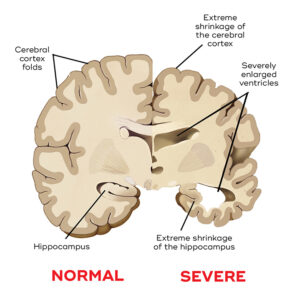Introduction
Dementia is a broad term used to describe a group of progressive brain disorders that affect memory, thinking, behavior, and the ability to perform daily activities. It is not a specific disease but rather a syndrome caused by various conditions, including Alzheimer’s disease, vascular dementia, and Lewy body dementia. Dementia often results in a decline in cognitive function that interferes with a person’s ability to live independently.

Symptoms
The symptoms of dementia can vary depending on the specific condition and individual, but commonly include:
Memory loss: Difficulty remembering recent events, names, or important information.
Cognitive decline: Challenges with problem-solving, reasoning, and decision-making.
Communication difficulties: Trouble finding the right words, following conversations, or understanding instructions.
Confusion and disorientation: Getting lost in familiar places, being unaware of the time or date.
Changes in behavior and mood: Personality changes, irritability, depression, anxiety, and agitation.
Difficulty with daily tasks: Struggling to perform routine activities such as dressing, cooking, or managing finances.
Diagnosis
Diagnosing dementia involves a comprehensive evaluation and ruling out other potential causes of cognitive decline.
The diagnosis process may include:
Medical history and physical examination: A detailed discussion of symptoms, medical history, and a physical examination to identify any underlying health conditions.
Cognitive assessments: Tests to evaluate memory, thinking, and problem-solving skills.
Brain imaging: Imaging techniques such as magnetic resonance imaging (MRI) or positron emission tomography (PET) scans to assess brain structure and function.
Laboratory tests: Blood tests to rule out other potential causes of cognitive impairment, such as thyroid problems or vitamin deficiencies.
Treatment
While there is no cure for most types of dementia, treatment focuses on managing symptoms, slowing down the progression of the disease, and providing support.
Treatment options may include:
Medications
Cholinesterase inhibitors: These medications help improve memory, thinking, and daily functioning in some individuals.
Memantine: It is prescribed to manage moderate to severe dementia symptoms and may help regulate brain cell activity.
Other medications: Additional medications may be prescribed to manage specific symptoms, such as depression, anxiety, or sleep disturbances.
Supportive therapies
Cognitive stimulation: Engaging in activities that stimulate thinking, memory, and social interaction.
Occupational therapy: Techniques and strategies to assist individuals in performing daily tasks and maintaining independence.
Speech therapy: Assisting with communication difficulties and improving language skills.
Caregiver support:
Education and counseling: Providing information and guidance to caregivers on understanding the disease, managing symptoms, and accessing support services.
Support groups: Joining support groups can provide emotional support, share experiences, and provide practical advice.
Lifestyle Changes
In addition to medical treatment, certain lifestyle changes may help individuals with dementia:
Structured routine: Establishing a daily routine can provide a sense of familiarity and help individuals with dementia feel more secure.
Simplify tasks: Breaking down tasks into smaller, manageable steps can make them easier to understand and accomplish.
Safety measures: Ensuring a safe living environment by removing potential hazards, using locks or alarms, and adapting the home for safety.
Healthy diet: Consuming a balanced diet with nutrient-rich foods, such as fruits, vegetables, whole grains, and lean proteins, to support overall health.
Physical exercise: Engaging in regular physical activity, as appropriate for the individual’s abilities, can help improve mood, cognition, and overall well-being.







